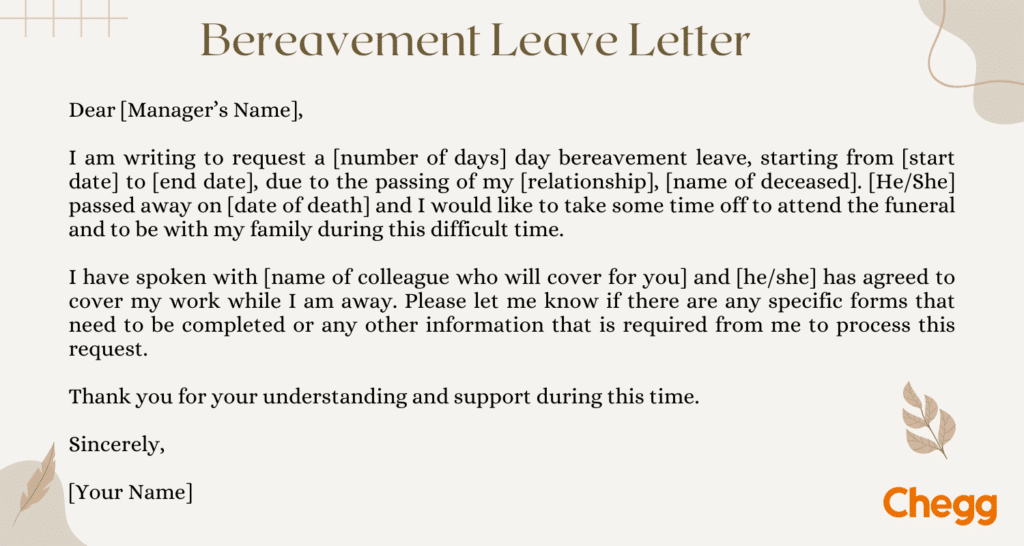What is Bereavement Leave and How to Apply for It
Bereavement is a period of grief or mourning a person experiences after losing someone. As the name suggests, bereavement leave is also known as death leave or funeral leave. Though there are no written laws on providing bereavement leave, most companies offer paid leave for compassionate reasons, to ease the employee’s distress. It is sanctioned […] The post What is Bereavement Leave and How to Apply for It appeared first on Chegg India.

Bereavement is a period of grief or mourning a person experiences after losing someone. As the name suggests, bereavement leave is also known as death leave or funeral leave. Though there are no written laws on providing bereavement leave, most companies offer paid leave for compassionate reasons, to ease the employee’s distress. It is sanctioned by an employer as time granted after the death of a close person of the employee. It gives them the time to grieve, take part in rituals and take care of formalities, if any.
What is Bereavement Leave Policy?
Most companies offer 3 to 5 days of bereavement leave. It can extend if the employee travels or attends a religious ceremony. In such cases, employees should allow managers to know beforehand and treat it accordingly. Relative death leave or death funeral leave are other commonly known names for bereavement leave in the corporate industry.
Larger companies often have official policies for how to support bereaved employees. Businesses, small to medium-scale firms, work with their employees to know the bereavement leave requirements. Family bereavement or the death of a close relative is the most common reason that employers grant such grievance leaves to their employees.
The following people qualify as close relatives for most employers:
- Siblings
- Parents, including adoptive parents and step-parents
- Civil partner or spouse
- Child, including adoptive kids and step-children
Some companies also identify grandparents, grandchildren, and the parents and siblings of your spouse. Some companies even allow employees to take bereavement leave following the loss of an extended family member or close friend.
Although it is not critical to have a bereavement policy or bereavement leave policy, your company can show that they care for your workers’ well-being. Considering the compassionate nature of the leave, companies do not include it as a part of the benefits. However, there is a certain procedure for applying for bereavement leave. Let’s learn more about the same in detail.
How Can One Apply for Bereavement Leave?
Discussing bereavement leave with your employer before taking time off is vital. Most employers will support bereaved employees and understand their need to take time off. Generally, employees apply for this death funeral leave not only as a condolence leave but also to look after the funeral arrangements.
If you are also wondering how can employees ask for bereavement leave, we will try to help you. You can set your bereavement leave after your loved one passes away as soon as possible. However, an employee should follow these steps when asking for bereavement leave.
Check Your Bereavement Leave Policy
You can determine whether your company offers paid bereavement leave and how long the time will last. You also should know whether your leave is different from your leave entitlements or whether your company will deduct it from your paid vacation days.
Companies with bereavement leave policies will outline them in the employee handbook or in workplace policies. You can check your manual to determine your company’s requirements and steps for bereaved employees requesting and taking leave.
Notify Your Employer as soon as Possible
If your loved one is not in good fitness, you should discuss the situation with your employer. It will enable them to prepare for the possibility that you may take bereavement leave in the upcoming time.
Check Your Eligibility for the Leave
It depends on the familial relationship you have with the departed. Some firms can also provide time off if the departed is a distant relative. He or she might be a close friend and their passing away can affect your emotional well-being. Considering the subjective nature of the leave, it can change for people.
Sample for Bereavement Leave
Here’s a sample bereavement leave application to help you save time during those difficult times. The bereavement leave application format is minimal and is meant to only notify your employer/ manager.
Dear Mr. Agarwal,
I regret to inform you that my XYZ passed away today, tragically and abruptly.
In light of these circumstances, I, therefore, request you to allow me 5 days of leave beginning today.
Thank You
ABC,
Sales Manager
Detailed Sample Bereavement Letter

When Applying for a Bereavement Leave…
Decide How Much Time You Want and Make a Timeline
Consider your responsibilities, mental health, and finances when determining how much time you need. Many employees want to take a mix of bereavement leave and regular leave after the personal loss of a loved one. If your company has a generous paid leave policy, you should take an extended break. Use sick leave or personal leave after such an incident.
Inform the Coworkers
Ask your HR or supervisor to communicate with your colleagues. You should request your human resources or supervisor to notify your colleagues of the reason and expected time for your leave. This ensures that they manage the work efficiently in your absence accordingly. You also don’t have to answer questions about your absence on your return to work.
Provide Required Assistance
Being a sincere employee, you will not want to hamper the work of the company. Thus, if possible, ensure you leave needed notes for your existing duties at your workplace to allow your colleagues to manage your responsibilities. If you plan to answer questions during your leave, add your contact details to the note. After you come back from such leaves, you can also ask for a coworker to help you with your workload.
After discussing your bereavement leave with your supervisor and human resources department, put your request in writing. Your written leave request will give you and your employer some official stuff to refer to during and after your leave. Therefore, it is best to go with the formal letter. Though, an email will suffice for some workplaces. Ask what your company prefers in your face-to-face or phone meeting.
Documents Required for Bereavement Leave
Sometimes employers can ask for a few forms and documentation for bereavement leave. Some businesses ask their employees to provide official documentation that supports their request for bereavement leave:
- It may include copies of obituaries and travel documents.
- It may include all the documentation needed to ensure that your company grants you bereavement leave without delay.
- Some companies may have forms that employees sign to ensure that they get paid for bereavement leave.
Dealing with Grief During Bereavement Leave
In conclusion, bereavement leave is a crucial benefit that allows employees to take the time they need to grieve the loss of a loved one without worrying about their job security or financial stability. It is important for employers to understand the significance of this type of leave and to provide it as part of their benefits package.
By doing so, they can demonstrate compassion and support for their employees during a difficult time in their lives. Furthermore, bereavement leave can ultimately improve employee morale, productivity, and loyalty, leading to a more positive and cohesive workplace culture. It is therefore essential for employers to recognize the value of bereavement leave and to offer it as a necessary component of their overall employee benefits package.

Frequently Asked Questions
In India, there is no such rule that makes it mandatory to provide paid leave for bereavement. Although, most companies consider it as paid time off.
Write your request for bereavement leave formally and politely. Send your request to your company’s Human Resources Department. Your company may ask you to include the following with your request:
1. Include the name of your loved one, the date and place of their passing, and the relationship they shared with you.
2. How much bereavement leave do you wish to take?
3. When do you plan to return to your work?
4. Any arrangement you made for other employees to take over your duties in your absence.
5. Whether you are available by phone or email to discuss work matters.
6. You should thank your employer’s understanding during the trying time.
As per Indian law, it is a grant of paid time off from work to an employee at the time of the death of an immediate family member or a close relative such as parents, grandparents, siblings, spouse, children, and in-laws. He or she will be eligible for up to 7 days’ leave.
No rule makes it compulsory to offer paid time off for bereavement. Nevertheless, most companies offer bereavement leave as a separate class and treat it the same as sick time off or vacation time off.
Most companies do not ask for proof of death in the case of a close family member’s demise. If needed, you can ask for the arbitrary note or funeral program.
Related Reads:
The post What is Bereavement Leave and How to Apply for It appeared first on Chegg India.


















/cdn.vox-cdn.com/uploads/chorus_asset/file/25115065/DCD_Avishai_Abrahami.jpg)







